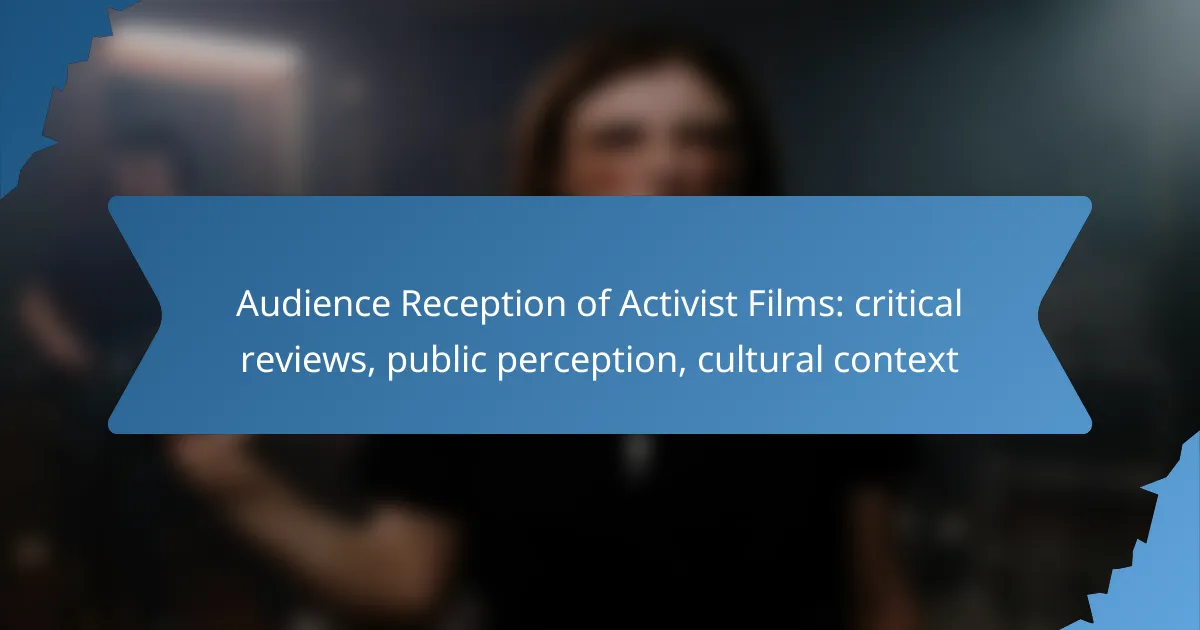Activist films have garnered a generally positive reception in the UK, with audiences valuing their emphasis on social justice themes. However, the effectiveness of these films in provoking thought and inspiring change can be influenced by narrative techniques, cultural context, and external factors such as marketing and social media. Critical reviews often assess their storytelling and emotional resonance, highlighting the importance of how these films communicate their messages to the public.

How do audiences perceive activist films in the UK?
Audiences in the UK generally respond positively to activist films, appreciating their focus on social justice issues. However, perceptions can vary widely based on narrative techniques and cultural context.
Positive reception of social justice themes
Films that highlight social justice themes often resonate with UK audiences, particularly those addressing issues like climate change, racial equality, and human rights. Viewers tend to engage deeply with narratives that reflect their values and concerns, leading to increased awareness and discussions around these topics.
For example, documentaries that showcase grassroots movements or highlight personal stories of struggle can inspire empathy and motivate action among viewers. This emotional connection often translates into a strong support for the causes depicted in these films.
Criticism of narrative techniques
Despite the positive reception of social justice themes, some activist films face criticism for their narrative techniques. Audiences may find certain storytelling methods, such as heavy-handed messaging or lack of character development, detract from the overall impact of the film.
Critics argue that when films prioritize ideology over storytelling, they risk alienating viewers who might otherwise be sympathetic to the cause. Striking a balance between informative content and engaging narratives is crucial for maximizing audience connection.
Impact of local cultural context
The cultural context in the UK significantly influences how activist films are received. Factors such as regional issues, historical events, and current political climates shape audience perceptions and engagement levels. For instance, films addressing Brexit-related themes may evoke strong reactions based on individual political beliefs.
Moreover, local activism and community engagement can enhance the relevance of a film. When audiences see their own experiences reflected in the narratives, it fosters a sense of belonging and urgency, further driving the film’s impact.

What are the critical reviews of notable activist films?
Critical reviews of notable activist films often highlight their ability to provoke thought and inspire social change. These films are typically evaluated based on their storytelling, emotional impact, and the effectiveness of their message in raising awareness about important issues.
Documentary impact of “13th”
“13th,” directed by Ava DuVernay, explores the intersection of race, justice, and mass incarceration in the United States. Critics praise its powerful narrative and thorough research, which connects historical injustices to contemporary issues. The film’s impact is evident in its ability to spark discussions about systemic racism and inspire activism.
The documentary employs a mix of archival footage and expert interviews, making complex topics accessible to a broad audience. Its critical reception includes accolades for its compelling storytelling, which has resonated with viewers and encouraged them to engage with the subject matter.
Audience reactions to “The Square”
Analysis of “The Act of Killing”
“The Act of Killing” presents a disturbing look at the Indonesian mass killings of 1965-66 through the eyes of the perpetrators. Critics have lauded the film for its innovative approach, allowing viewers to witness the chilling reenactments that challenge conventional narratives of history. This unique perspective forces audiences to confront the moral implications of violence and complicity.

What factors influence public perception of activist films?
Public perception of activist films is shaped by various factors including marketing strategies, social media influence, and the role of film festivals. These elements can significantly affect how audiences interpret and engage with the messages presented in these films.
Influence of marketing strategies
Marketing strategies play a crucial role in shaping public perception of activist films. Effective campaigns can create buzz and attract attention, while poor marketing may lead to limited visibility. For instance, using targeted advertising on platforms where potential viewers are active can enhance reach and engagement.
Additionally, partnerships with organizations that align with the film’s message can amplify its impact. Collaborations with NGOs or social movements can lend credibility and encourage audiences to support the film, both financially and through word-of-mouth promotion.
Role of social media in shaping opinions
Social media is a powerful tool that influences how activist films are received by the public. Platforms like Twitter, Instagram, and Facebook allow for immediate sharing of opinions, reviews, and discussions, which can sway audience perceptions. A film that garners positive buzz on social media can attract larger audiences, while negative feedback can deter potential viewers.
Engagement through hashtags and online campaigns can also mobilize communities around specific issues depicted in the films. For example, a film addressing climate change may inspire viewers to share their thoughts and actions on social media, creating a ripple effect that enhances its visibility and relevance.
Impact of film festivals on audience reception
Film festivals often serve as important platforms for activist films, significantly impacting audience reception. Premiering at a reputable festival can enhance a film’s credibility and attract critical attention, which may lead to wider distribution. Festivals provide opportunities for filmmakers to engage directly with audiences, fostering discussions that deepen viewers’ understanding of the film’s themes.
Moreover, awards and accolades received at festivals can boost a film’s profile and encourage viewers to seek it out. For instance, a film that wins a prestigious award may see increased ticket sales and streaming interest, highlighting the importance of festival participation in shaping public perception.

How do cultural contexts affect activist film reception?
Cultural contexts significantly shape how activist films are received by audiences. Factors such as regional values, historical experiences, and social movements influence public perception and critical reviews, ultimately affecting the film’s impact and effectiveness.
Regional differences in the UK
In the UK, regional differences can lead to varied receptions of activist films. For instance, films addressing environmental issues may resonate more in areas heavily impacted by climate change, such as coastal regions, compared to urban centers where economic concerns dominate. Local cultural narratives and community priorities play a crucial role in shaping audience engagement.
Moreover, the political climate in different regions can affect how films are interpreted. For example, films promoting social justice may be met with enthusiasm in progressive cities like Brighton, while facing skepticism in more conservative areas.
Historical context of activism in film
The historical context of activism in film is essential for understanding audience reception. Films that draw on significant social movements, such as civil rights or feminist movements, often evoke strong emotional responses due to their connection to collective memory. This historical resonance can enhance the film’s relevance and urgency.
Additionally, the evolution of film technology and distribution has influenced how activist messages are conveyed. The rise of documentaries and online streaming platforms has democratized access to activist content, allowing for broader dissemination and discussion of critical issues.
Comparison with international activist films
International activist films often reflect diverse cultural contexts, which can lead to different reception patterns. For example, films from countries with strong censorship laws may adopt more subtle storytelling techniques, while those from more open societies may present overt critiques of government policies. This variance can affect how audiences perceive the urgency and authenticity of the message.
Furthermore, cross-cultural comparisons reveal that films addressing global issues, such as climate change or human rights, may garner international support, but local interpretations can vary widely. Understanding these differences is crucial for filmmakers aiming to reach diverse audiences effectively.

What are the common themes in activist films?
Activist films often explore themes that resonate with social change, focusing on issues like environmentalism, human rights, and political dissent. These films aim to raise awareness, provoke thought, and inspire action among audiences.
Environmental activism
Environmental activism in films highlights the urgent need to address climate change, pollution, and biodiversity loss. Documentaries like “Chasing Ice” and “Before the Flood” showcase the impacts of human activity on the planet, urging viewers to consider their ecological footprint.
When creating or viewing environmental activist films, consider the effectiveness of visual storytelling in conveying complex scientific data. Engaging narratives can make the subject matter accessible and relatable, motivating audiences to participate in sustainability efforts.
Human rights and social justice
Films centered on human rights and social justice often depict struggles against oppression, inequality, and discrimination. Works like “13th” and “The Pursuit of Happyness” illustrate systemic issues, aiming to foster empathy and understanding among viewers.
These films can be powerful tools for advocacy, but they must balance emotional impact with factual accuracy. Filmmakers should ensure that they represent marginalized voices authentically while encouraging audiences to engage in social justice initiatives.
Political dissent and censorship
Political dissent and censorship are critical themes in activist films, often addressing issues like government oppression and the fight for free speech. Films such as “The Act of Killing” and “V for Vendetta” challenge viewers to reflect on the consequences of authoritarianism and the importance of dissent.
When exploring this theme, filmmakers should be aware of the potential risks involved in exposing sensitive political issues. Engaging with local contexts and regulations can help ensure that the message is communicated effectively while minimizing backlash or censorship.

How do activist films impact social change?
Activist films can significantly influence social change by raising awareness, shaping public opinion, and mobilizing communities around critical issues. Through compelling storytelling and visual narratives, these films often inspire action and encourage dialogue on pressing social matters.
Case studies of successful movements
Several activist films have played pivotal roles in successful social movements. For instance, “The Act of Killing” brought global attention to the Indonesian mass killings of 1965-66, prompting discussions about human rights and historical accountability. Similarly, “Blackfish” sparked widespread outrage over the treatment of orcas in captivity, leading to policy changes at SeaWorld and other marine parks.
These case studies illustrate how well-crafted narratives can galvanize public support and drive legislative changes. By focusing on personal stories and emotional appeals, these films create a connection that resonates with audiences, motivating them to engage with the issues presented.
Influence on public policy
Activist films often serve as catalysts for public policy changes by highlighting societal issues that require urgent attention. Documentaries like “An Inconvenient Truth” have been instrumental in raising awareness about climate change, influencing both public opinion and governmental policies on environmental regulations.
When these films gain traction, they can lead to increased advocacy efforts, prompting lawmakers to consider new legislation or amend existing laws. The combination of visual storytelling and factual evidence can create a compelling case for action, making it difficult for policymakers to ignore the public’s demand for change.
Engagement of younger audiences
Activist films are particularly effective in engaging younger audiences, who are often more receptive to visual media and social issues. Films like “13th” and “The Social Dilemma” resonate with younger viewers by addressing topics such as systemic racism and the impact of social media on mental health.
To maximize engagement, filmmakers often utilize social media platforms to promote their work, encouraging discussions and sharing personal stories related to the film’s themes. This approach not only raises awareness but also empowers younger generations to take an active role in advocacy and activism.
